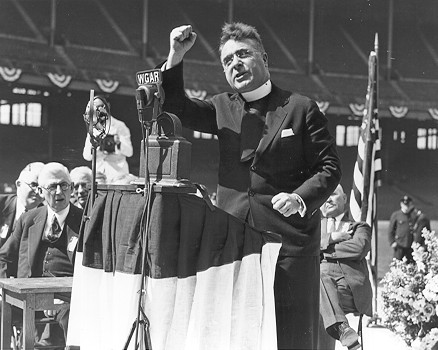By the grace-filled cooperation of individuals within the organization called “the Catholic Church,” we come to know Jesus Christ and His Way. The Church has no army divisions; no tanks; no hellfire missiles; just Christ, His Mystical Body, Sacraments, and saving message.
In a sense, the “Cult of Jesus” is the only authentic “cult of person” in all human history. All other “cults of person” (to distinguish from the Person of Christ, call them “cults of personality”), when not resisted, easily become forms of narcissism.
The Incarnation has logical consequences. If God truly became man and dwelt among us, it means He is a man with flesh and blood with all the limitations of time and space associated with His earthly humanity. He comes in peace and freedom. But He’s not superman, or the Terminator, or Robocop. Hence, in God’s providence, even Christ as man “depends” upon our free response to His teaching (always acknowledging the hidden working of God’s grace). Jesus does not force us. He persuades by the power of who He is and what He does and says.
God needs helpers because Jesus, the Word incarnate, is “only one man.” “And he called the twelve; and began to send them two and two, and gave them power over unclean spirits.” (Mark 6:7). Then He enlists the seventy-two disciples and sends them out on His behalf. Such was the beginning of what would become the Church, the “Mystical Body of Christ.”
After the Ascension and the Descent of the Holy Spirit, the message and cult of Jesus needed to be handed down in time, over the centuries. Evangelization is not automatic or magical, but requires our cooperation (in our highly individual roles) guided by God’s grace. The accounts of the mighty deeds of Christ and His teaching are proclaimed, committed to writing, and handed down from generation to generation. Jesus doesn’t work alone. By nature and Divine design, the spread of His “cult of Person” needs the people and structures of the Church.

But “cults of personality” – without God or the Person of Christ – always end in destruction. Wise kings rule with God’s justice, but their rule becomes lawless and ultimately self-destructive when it devolves into a “cult of personality.” The rule of King Solomon held out great promise, but ended badly because he forgot about the source of his legendary wisdom. The bloody history of the 20th Century reveals many attempts to foster political cults of personality, all failing badly, but bringing great death and destruction.
Religions, great and small, can be prone to engender false and potentially destructive “cults of personality” as well. Horrors like the Jonestown mass murder are easily seen. But there is plenty of evidence of alarming “cult of personality” problems emerging from within the Church herself.
Father Charles Coughlin (the social justice “Radio Priest” of the 1930s) and Fulton J. Sheen (whose TV ratings exceeded that of comedian Milton Berle) were real-life “celebrity priests.” By contrast, the popes of their day – custodians of the Church’s Magisterium – were dull and not particularly entertaining.
Then Pope John XXIII and later Pope John Paul II emerged as “celebrity popes” with unprecedented public appeal. JPII accomplished much in the geopolitical world and advanced Catholic orthodoxy at a time when dissent within the Church was widespread and very destructive. Like Fulton Sheen and John XXIII, John Paul used his popularity in the service of the Gospel; the name of Jesus was frequently on his lips. But the popular appeal of the modern clerical celebrity also set the stage for a serious displacement of the Person of Christ.
Blame Bing Crosby in part. In his 1944 movie classic, “Going My Way” Crosby’s character – Fr. Chuck O’Malley – had little to do with Christ. It had everything to do with a charismatic priest reaching out to youth by the power of his talent and personality. The film became very popular and – in an unintended way – arguably changed the way popular culture views ministers of the Gospel. We now tend to demand charismatic and “vibrant” priests often at the expense of the difficult truths of the Faith.
The immensely popular John the Baptist chose to “decrease” so that Christ would “increase.” (John 3:30) Today, there is a pronounced tendency for many ministers of the Gospel to promote their own “cult of personality,” becoming clerical entertainers, with Jesus and His sacred Name effectively choked off by narcissism. The temptation doesn’t stop with ordinary priests. Increasingly, we hear speeches by high-ranking prelates in which the name of Jesus is never mentioned. During his visit to America, Pope Francis addressed Congress, the United Nations, and Independence Hall, and the name of Jesus was not heard in the over 8,000 words of his three speeches.
The Catholic faith is not about rulers, popes, bishops, priests – or even saints, as necessary as these are to the machinery and mission of the Church. The Faith is fundamentally about knowing and loving Christ and living His Way unto salvation. A cleric’s narcissism may be entertaining for a time, but can never save. The narcissist, through his own perverted “cult of personality,” obstructs the view of Christ. And he needs to get out of the way.
The narcotic of vainglory and its warm sensation can be terribly addictive. So we can begin to break the allure by recognizing that all clerical authority comes from Christ alone. The same goes for those of us in the sacred ministry: in preaching and conversation, frequently placing the name of Jesus reverently on our lips.
“Therefore God exalted Him to the highest place, and gave Him the name above all names, that at the name of Jesus every knee should bow, in heaven and on earth and under the earth, and every tongue confess that Jesus Christ is Lord, to the glory of God the Father.” (Philippians 2:9-11)















